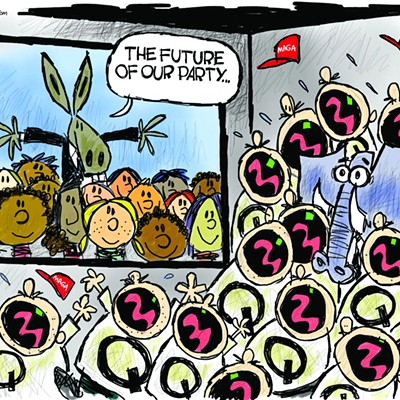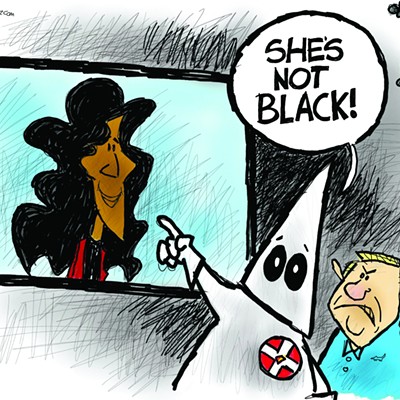Set up as a forum on a 2002 transportation proposition that would later be rejected by roughly three out of every four voters in Dunbar's northside Ward 3, the meeting quickly degenerated into an ugly yelling match as an angry crowd ranging from neighborhood activists to small-business owners blasted the plan, the tax and Dunbar herself for supporting it.
From all appearances, it was going to be a rocky four years for the former Republican lawmaker who was representing a heavily Democratic ward.
But as she seeks a second term next month, Dunbar has won over many of her early critics. Neighborhood leaders who were initially skeptical of Dunbar are now supporting her re-election bid.
"Kathleen and her staff have really come through for Ward 3," says Balboa Heights Neighborhood President Jane Baker. "They've brought more money to Ward 3 than in the past. I'm seeing so many more projects come to fruition over here."
Baker has watched Dunbar and her staff build close relationships with the local police precinct, get kids into youth programs and clean up the area by busting johns and hookers, as well as by demolishing the Tropicana Hotel, which had become a local prostitution and drug den.
Dunbar has built similar relationships with Ward 3 businesses. For example, she's helped Campbell Avenue merchants form a business association and develop marketing strategies to create a shopping district. Along the Campbell corridor, she's put in crosswalks to improve pedestrian safety and scored a half-million dollars in federal transportation funds for future improvements.
Dunbar boasts that she's improved Ward 3 in many other ways. She got rid of the Grant Road rush-hour reversible "suicide lane" and has pushed city staff to install more sidewalks and resurface roads. At Jacobs Park on Fairview Avenue north of Miracle Mile, she got the Arizona Diamondbacks to pitch in to build a Little League field and worked with a local Rotary Club to install a playground that's accessible to handicapped kids. On Sixth Avenue south of Grant Road, Dunbar--a former community outreach director for the Humane Society of Southern Arizona--used public and private dollars to put in a dog park.
Even Karin Uhlich, the Democrat who wants to unseat Dunbar next month, concedes that the Republican's staff has been working hard on constituent service. But she says Dunbar has to go, because she has sold out to special interests on major policy issues.
Uhlich, 42, who is making her first run for public office, has a solid background in social services. Between 1993 and 2002, she worked for the Primavera Foundation, a nonprofit that helps homeless people find housing, job training and employment.
She left the organization to found the Southwest Center for Economic Integrity, which strives to help low-income residents avoid being targeted by payday-lending businesses, day-labor employers and other exploitative industries.
In her rookie run for office, Uhlich has gathered a wide range of supporters, from co-chair George Miller, the former Tucson mayor, to Katie Bolger, the former Green Party activist who is organizing volunteers.
Like Dunbar, Uhlich has landed support from neighborhood activists. Tom Rhodes, president of the Richland Heights East Neighborhood Association, says he's supporting Uhlich because he's found Dunbar to be combative and unpleasant since she was elected.
Uhlich says her work with the community's less fortunate has given her insights into how government policy affects the underclass--and she sees the City Council as fumbling the ball.
"There are substantial differences between the way she and I would handle city policy," Uhlich says. "It's not negativity; it's accountability."
For starters, Uhlich criticizes Dunbar for the way she enacted the trash-collection fee (although Uhlich herself supports a trash fee of some kind) and for creating tuition fees for KIDCO, the city's after-school program. (For details, see "Numbers Racket," page 22.) Uhlich also accuses Dunbar of undermining efforts to stem methamphetamine abuse, while Dunbar says she's worked closely with police to find strategies to fight meth. (See "Speed Limits," page 11.)
Uhlich says Dunbar opposed a legislative effort by the Arizona League of Cities and Towns to push for regulation of payday-lender and predatory-mortgage companies and has opposed development impact fees to pay for new roads and parks.
She also complains that Dunbar has consistently voted to soften city regulation of the billboard industry. Last year, for example, Dunbar voted against appealing a ruling to the Arizona Supreme Court. The council majority supported the appeal and won the case, securing the city's power to enforce strict billboard regulation.
Dunbar says the city is wasting too much money on the legal fight with Clear Channel Outdoor Advertising and should reach a settlement with the billboard company. She doesn't see billboards as an important issue.
"I haven't gotten one phone call yet from a constituent who says, 'That damn billboard is really bothering me.' I get phone calls about, 'Can you get me sidewalks? Can you fix the pothole? Can you can get a crosswalk?'"
Uhlich says Dunbar's real loyalties are revealed by the fact that the incumbent declined to participate in the city's matching-funds program. Under the program, candidates who agree to limit their spending to roughly $85,000 can get a dollar-for-dollar match from taxpayers.
Uhlich, who had raised $40,924 in private money and received $35,114 from the city as of Sept. 19, predicts Dunbar will exceed the program's spending limits trying to sell herself as a moderate Republican when she really represents the party's far-right wing.
As of Aug. 24, Dunbar had raised $50,047. (New reports are due this week.) Dunbar declined last week to say how much more she had raised, but said she still remained under the $85,000 spending limit for candidates participating in the city's program, which she says she didn't use because of abuses she's witnessed in previous years.
Dunbar says all of Uhlich's talk about policy makes her suspect that the Democrat "wants to talk issues to death, and she's not going to do anything for constituent service. And for far too long, this ward has been neglected by people who were part-time council members."
But Uhlich says Dunbar's recent concern about issues such as payday-loan businesses and meth abuse is all an act designed to fool voters.
"She is behaving a certain way, because she's up for re-election," Uhlich says. "There's no doubt about it. And on Nov. 9, it's going to be business as usual if she's re-elected."















